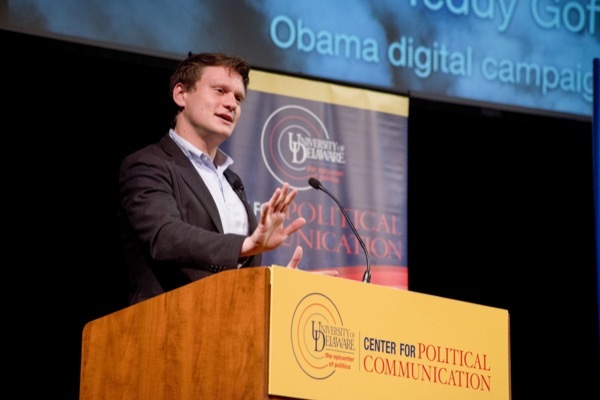National Agenda 2014: Teddy Goff
Goff discusses evolving role of social media in political campaigns

1:20 p.m., Nov. 3, 2014–Teddy Goff, who directed President Barack Obama’s 2008 and 2012 digital campaigns, believes that while technology has radically changed the way campaigns are conducted, the average voter still wants to be listened to and respected.
Goff elaborated on the nature of political campaigns in the digital age during a University of Delaware National Agenda speaker series talk given Wednesday evening, Oct. 29, in Mitchell Hall.
During the 2012 campaign, the Yale University alumnus managed a 250-person team responsible for social media, email, web, online advertising, design and video.
Digital communications had come a long way since Obama’s 2008 campaign that “is now seen as the first social media campaign,” Goff said.
The platforms for social media and mobile communications that most people are familiar with today were still in their infancy in February 2007 when Obama, a U.S. senator from Illinois, announced he was running for president, Goff said.
“The use of social media in that campaign was less that 10 percent of what it was in 2012,” Goff said. “Twitter was in its infancy. Today, people in the corporate and political worlds talk about having Twitter strategies, but if you had talked about such things in 2008, you would have been laughed out of the room because they weren’t part of the vocabulary.”
The newly launched campaign was actually just months under way when the iPhone was introduced in the summer of 2007, Goff noted.
Under Goff’s leadership, the 2012 campaign raised more than $690 million via the Internet, and registered more than one million voters online. Goff’s team also built a Facebook following of more than 45 million people and a Twitter following of more than 33 million.
“We thought, as campaign conductors, that there were a lot of other things that came with this rapid change in technology,” Goff said. “We had to be on top of all the technological stuff, but we also saw that the relationship between ordinary people and campaigns, politicians and politics itself, had changed.”
Before social media, the role of the average campaign supporter was limited, Goff said.
“If you had a lot of money, you could write a big check, and if there were eight or 12 battleground states, you could go to a field office if one was near you,” Goff said. “All of a sudden, these tools were in the hands of everyone. People now had the ability to reach hundreds or thousands of people across state borders.”
Voter participation
Democracy has undergone a fundamental change in the way voters participate in today’s political campaigns, Goff said.
“People have the ability to reply back to a politician about a policy they may or many not like, and the friends of these people can see that such questions have been asked on social media,” Goff said. “People expect to be treated in a certain way and they expect people in positions of power to be responsible. They also want to receive feedback.”
While much has changed, campaigns still seek to fulfill the same basic goals and objectives, Goff said.
“We still want to recruit volunteers, register voters, turn them out to vote, persuade those who turn out to vote our way, and to raise money to pay for all of this,” Goff said. “These are the same things we would have wanted to do four years or 40 years earlier.”
While the ways in which voters receive information has changed, people still hold to a set of personal values by which they judge the people they are voting for, Goff said.
“We thought that what people wanted from us was to be respected,” Goff said. “We felt that people wanted to have a sense of being connected and of being inspired in what they were participating in.”
Goff also believes that voters are a lot smarter than they way they are perceived in various polls.
“It’s very enlightening to interact with the actual voters,” Goff said. “The closer you get to them, the more respect you have for them.”
Goff also joined Lindsay Hoffman, associate professor in the Department of Communications, and Ralph Begleiter, director of UD’s Center for Political Communication, in taking questions from students and community members on a wide variety of topics.
The 2014 National Agenda speaker series, presented by the Center for Political Communication, is free and open to the public.
The final two presentations are scheduled at 7:30 p.m., Wednesdays, Nov. 12 and Nov. 19, in Mitchell Hall. Mike McCurry, former press secretary to President Bill Clinton, will discuss the “Meaning of the Midterm Elections? on Nov. 12 and Stephanie Cutter and UD alumnus Steve Schmidt, who directed Republican John McCain’s presidential campaign in 2008, will present a “Post-Election Analysis? on Nov. 19.
Article by Jerry Rhodes
Photos by Duane Perry
